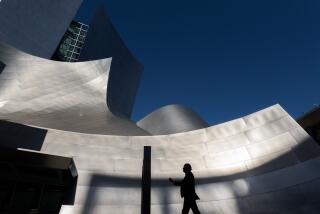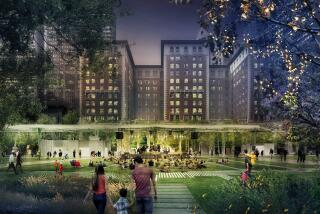Group alleges L.A. hid height limit for Frank Gehry project on Sunset Boulevard
Real estate developer Townscape Partners scored a major victory at City Hall three months ago, winning approval of a Frank Gehry-designed development on Sunset Boulevard despite heated opposition.
After a lengthy back-and-forth between city officials and neighborhood groups over the project’s height, the Los Angeles City Council allowed a portion of the residential and retail project to reach 178 feet.
Now, foes of the development say they have uncovered a major flaw in the city’s decision: a decades-old covenant on the property that limited development on the site to no more than 45 feet.
Fix The City, a nonprofit advocacy group suing over the project, said in legal documents filed this week that city officials failed to make the proper findings needed to lift the covenant’s height limit. Laura Lake, who serves on the group’s board, said planning officials misled the public — and the city’s elected officials — by saying the project site had no height limit.
“It’s one thing for a developer to misrepresent [what’s required],” she said. “It’s another thing for the city to not tell the truth.”
Brian Lewis, a spokesman for Townscape Partners, declined to comment. Yeghig Keshishian, spokesman for the Department of City Planning, said the height restriction contained in the covenant applies only to the shopping center currently on the site.
Under the document’s terms, the height restriction for the site ceases to exist when an application for a new project is filed — and the City Council determines that the new project complies with the planning rules, Keshishian said.
The city has been battered by lawsuits over development in and around Hollywood. Neighborhood activists have succeeded in overturning the approval of a Target shopping center, a 299-unit apartment building and the Millennium skyscraper project.
Three years ago, Fix The City persuaded a judge to strike down the Hollywood Community Plan Update, a document that allowed taller and denser buildings near transit lines. The group also succeeded in forcing the city to cast do-over votes on Mobility Plan 2035, which calls for hundreds of miles of new bicycle and bus-only lanes.
The council voted in November to approve the 229-unit Townscape project, which includes two residential towers, 65,000 square feet of commercial space and a pedestrian plaza.
Since then, several lawsuits have been filed over the development, which is near the L.A.-West Hollywood border and frequently referred to as 8150 Sunset. Those cases have challenged the project’s environmental impact report and questioned plans for demolishing a midcentury modern bank building on the site.
Estevan Montemayor, spokesman for Councilman David Ryu, said his office had not been informed of the covenant’s existence during the approval process for 8150 Sunset. Ryu is now reviewing the legal documents submitted by Fix The City, Montemayor added.
“Every step along the way, we were told by the planning department there was no height limit — and that there was nothing we could do about it,” he said.
The covenant was recorded in 1986 as part of a shopping center development at the corner of Sunset and Crescent Heights boulevards. The document established restrictions on both the height and the square footage of the shopping center.
The covenant says that its development restrictions “run with the land and shall be binding on future owners.” But it also states that those limits “shall cease to apply” if a new or different project is filed with the city — and complies with various planning documents.
Lake, the Fix The City board member, acknowledged that the city has the power to void the restrictions in the covenant. But she argued that lawmakers did not take the proper steps to carry that out and failed to disclose the document’s existence during the project’s environmental review process.
To correct that error, the city would need to circulate a new environmental impact report — a process that could take up to a year — and conduct a new round of votes on the project, Lake said.
In its lawsuit, Fix The City also contends that the city did not accurately analyze traffic impacts or fire department response times in the area. The group also alleges the city also failed to follow proper procedures for turning over city property — and closing a portion of a public street — for the development.
A Townscape Partners representative did not respond to questions about those assertions.
Twitter: @DavidZahniser
More to Read
Start your day right
Sign up for Essential California for news, features and recommendations from the L.A. Times and beyond in your inbox six days a week.
You may occasionally receive promotional content from the Los Angeles Times.







